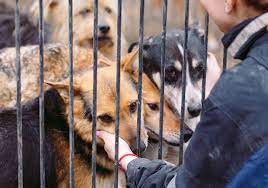Finding the right food for your dog can be a daunting task, as there are so many options available on the market.
However, by considering a few key factors, you can make the process easier and choose a food that is perfect for your furry friend. In this article, we’ll discuss the four main things to consider when selecting a food for your female dog.
Table of Contents
ToggleLife stage:
It’s important to choose a food that is formulated for the specific life stage of your dog. Puppies have different nutritional needs than adult dogs, and senior dogs have different needs than adults as well.

Puppy food is typically higher in protein and calories to support growth and development, while adult dog food is formulated to maintain overall health and wellness.
Senior dog food may be lower in protein and calories to support weight management and may also include added nutrients to support joint health.
Size:
The nutritional needs of small dogs are different from those of larger dogs, so it’s important to choose a food that is formulated for your dog’s size.
Smaller dogs have faster metabolism and higher energy needs, so they may require a food that is higher in protein and calories. Larger dogs, on the other hand, may need a food that is lower in protein and calories to support healthy weight management.
Health concerns:
If your dog has any specific health concerns, such as food allergies or sensitivities, it’s important to choose a food that is appropriate for her specific needs.
For example, if your dog has a food allergy, you may need to choose a food that is formulated with a novel protein source (such as duck or rabbit) to minimize the risk of an allergic reaction.
Ingredient quality:
The quality of the ingredients in your dog’s food can have a big impact on her overall health and well-being. Look for a food that is made with whole, high-quality ingredients and avoid those with a lot of fillers or artificial additives.
Choosing a food made with real meat, vegetables, and whole grains can help ensure that your dog gets the nutrients she needs to thrive.
Brand reputation:
When choosing a food for your female dog, it’s important to consider the reputation of the brand.
Look for a brand that has a good track record and a history of producing high-quality products. Do some research and read reviews from other pet owners to get an idea of the brand’s reputation.
Form of the food:
Dog food is available in several forms, including dry, wet, and frozen. Consider which form would be most convenient for you and the best fit for your dog’s needs.
Dry food is typically the most convenient and easy to store, but it may not be as palatable for some dogs. Wet food is often more expensive, but it may be more appealing to picky eaters.
Frozen food is a good option if you want to feed your dog a raw diet, but it can be more expensive and requires more planning and preparation.
Price:
It’s important to find a food that fits your budget, but be aware that cheaper options may not always be the best choice. It’s important to balance price with quality and nutritional value.
Some high-quality, premium brands may cost more, but they may also include higher-quality ingredients and offer more nutritional benefits.
Feeding guidelines:
Each brand of dog food will have specific feeding guidelines based on your dog’s size and age.
Make sure to follow these guidelines to ensure that your dog is getting the right amount of food. Overfeeding or underfeeding can lead to health problems, so it’s important to be consistent with your dog’s meals.
Nutritional needs:
Consider your dog’s individual nutritional needs and look for a food that meets those needs. For example, if your dog is very active, you may want to look for a food that is higher in protein to support muscle development.
On the other hand, if your dog is less active, you may want to look for a food that is lower in calories and fat to help her maintain a healthy weight.
Other nutritional considerations may include the inclusion of certain vitamins and minerals, such as glucosamine for joint support or antioxidants for overall health and wellness.
It’s a good idea to consult with your veterinarian to determine your dog’s specific nutritional needs.
Conclusion
By taking into account your dog’s life stage, size, health concerns, and ingredient quality, you can choose a food that meets her specific needs and helps her live a long, healthy life.
Don’t forget to consult with your veterinarian to get personalized recommendations for your dog.
With a little bit of research and some careful consideration, you can find the perfect food for your beloved female dog.










![The Ultimate Guide to Road Tripping with Your Dog [2025 Update]](https://bellabeanupdate.com/wp-content/uploads/2025/05/pexels-photo-1143369-300x209.jpeg)




















